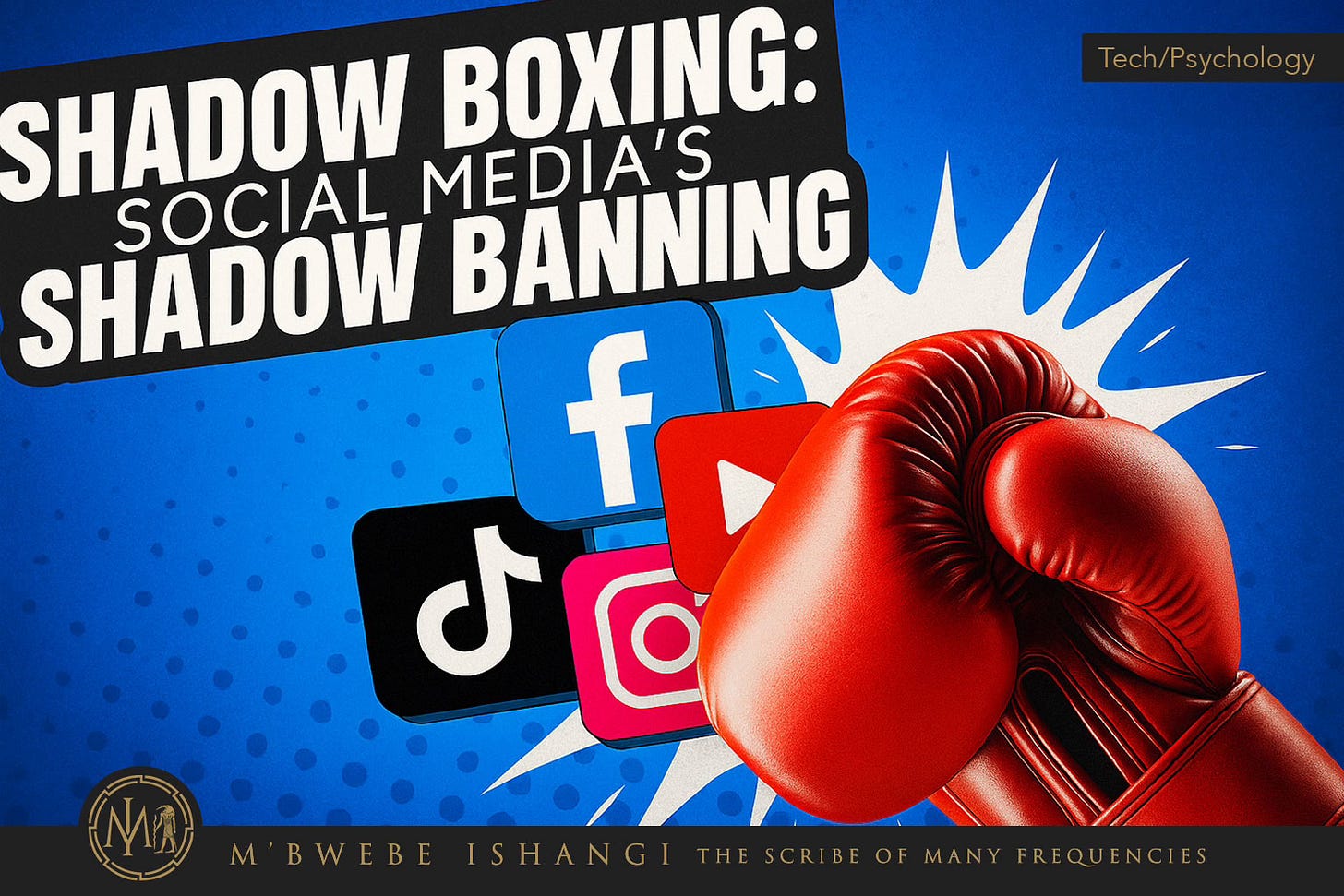Ever got this message on Facebook, IG, or TikTok? This was all the evidence I needed to confirm what I have longed thought… I am shadow banned on social media!
I used to think of all the friends and followers I’ve been blessed to have all these years on social media, I wondered whenever I posted something deep or intellectual (which is 99% of the time) I got less traffic than if I posted something like my #CardioBro series where I post workouts like doing speed rope for example. The engagement is a different story.
Initially I thought, “damn, our people ain’t interested in cultural knowledge?!” Then I thought, is it possible maybe it’s not showing up in their feeds?
The next question is why? I mean, I believe I pretty much get errbody else’s, so why wouldn’t they get mines?
Then I started hearing about this buzzword, “shadow banning” defined as blocking (a user) from a social media site or online forum without their knowledge, typically by making their posts and comments no longer visible to other users.
Now I know there’s user blocking, but what about platform blocking? This is a real thing because I’ve asked folks about it and some of them too have complained of some of their posts having limited reach than usual on particular posts.
Social Media was designed to have a specific kind of diet; a vegan it is not. Like the masses, it prefers cheap, processed, and quick nutrition-less microwaveable meals in the form of content. Social media is a place to socialize, not mobilize for if it were, it’d be called that…
Admittedly, it gave me sort of an ego rush to think these platforms might see my message as a potential galvanizing threat. But I then let the temporary ego pass and realized just how much social media depends on us feeding this ever-hungry-for-content monster. It simply cannot exist if everybody stopped posting—hmm, talk about a boycott, imagine if this happened for just ONE day!).
It was then I realized it was designed to have a specific kind of diet; a vegan social media is not. Like the masses, it prefers cheap, processed, and quick nutrition-less microwaveable meals in the form of content, like comedy clips, narcissistic body pics, and in the gym but not really workout out consistently videos. 🙄 (No knock against the real hedz)
In its minor defense though , social media is a place to socialize, not mobilize for if it were, it’d be called that. But where else could you on a large scale? If there were any other place to engage billions with a few ideas, a simple keystroke and a like, there could actually be some mobilizing!
This is all about the algorithm (aka platform access as well as blocking) and who actually controls it. Defined as a set of rules and signals that determine how content is ranked, filtered, and organized for users on social media platforms. Its main purpose is to show users content that aligns with their preferences and previous interactions, creating a personalized experience. ‘The algorithm’ (not sure why it’s referred to as singular as if it’s a person) has the power of censorship.
Algorithms dictate much of what appears in our feeds, shaping our online experiences in ways we don’t always realize. “They” decide which posts are worth showing to us and what content we find engaging. But how exactly do social media algorithms determine what we see and why? And, perhaps most importantly, how do these algorithms impact our lives, behaviors, and beliefs?
Social media platforms collect vast amounts of data about us: the pages we like, the posts we comment on, the time we spend on certain types of content, and even how we interact with ads. This data is then analyzed by algorithms to create a tailored experience for each user. The goal is simple: to show you content that you’re most likely to engage with, based on your behavior and preferences.
But this unadvised server of things “they” think we want to see is actually a form of dictatorship. On one hand, it means you’re more likely to see content that aligns with your interests: a workout video from a fitness influencer, or a comedy skit creator, social media algorithms choose what they think makes you happy and engaged by providing content you enjoy.
On the other hand, this constant stream of personalized content can lead to a “filter bubble”, where algorithms only show you content that aligns with your existing beliefs and preferences, limiting exposure to diverse viewpoints. This can create an echo chamber, where users are exposed to the same ideas, opinions, and ideologies over and over again. As a result, it becomes harder to think critically, making most become more entrenched in their own perspectives.
Take a review of your feeds, unless you’re already familiar, how often have you seen posts about the work Interim President of Burkina Faso Ibrahim Traoré, President Netumbo Nandi-Ndaitwah of Namibia, or Colonel Assimi Goïta of Mali on Facebook, or much more, the u.s. media?
The algorithm controls information you have access to on social media, so if you’re a person with a message like me, it has the ability to dictate maybe not your voice but certainly your reach!
Finding your Algo-rhythm
It’s quite possible the algorithm could be reversed by users if we simply decided to post and engage on more consciously related content. Imagine if you, reading this, decided to post something communally enhancing a mere 3 out of every 10 posts you put out. It can be on culture, history, health, spirituality, sustainable politics, anything of that sort. If each of you did this consistently, then told your followers to do the same, imagine what the algorithm; or at least your feed would look like in a month!
I believe if we took a little more accountability in our role as chefs delivering daily diets of narcissistic and senseless meals to the algorithm—which in turn shares with the world—we could actually change social media’s behavior which will have an effect on people’s behavior and mental health.
Perhaps we’d become a little more interested in buying and cultivating land domestic and abroad instead of just being “flew’d out” and a stamp on your passport from a foreign country where you spent more time in a 5-star hotel than spending time with the locals and experiencing their culture.
Who knows? Maybe even sharing this piece can help bring nutritional balance to our daily diet of what social media currently offers. Not only would I be indebted to you if you did, this could begin a mobilized effort to rid shadow-bans from people with a communal message.
Bless…















Share this post